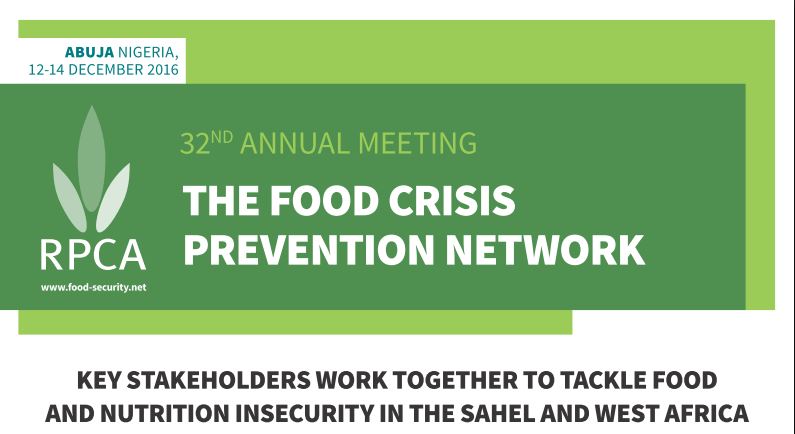Key stakeholders work together to tackle food and nutrition insecurity in the Sahel and West Africa

Abuja, Nigeria, 14 December 2016 The Food Crisis Prevention Network (RPCA) gathered from 12-14 December 2016 in Abuja at the 32nd RPCA Annual Meeting. Held under the political leadership of the Commission of the Economic Community of West African States (ECOWAS) and the West African Economic and Monetary Union (UEMOA), the meeting was hosted by the Government of the Federal Republic of Nigeria, with the participation of His Excellency Dr. Audu Ogbeh, Federal Minister of Agriculture and Rural Development, Representative of the President of the Federal Republic of Nigeria and H.E. Mr Marcel Alain de Souza, ECOWAS Commission President. It was the first time that a RPCA meeting took place in Nigeria, providing a timely opportunity for the Network to highlight the implementation of the Cadre harmonisé in Nigeria as one of its key achievements. There are now 16 out of 36 Nigerian states, almost half of the country, that use this tool to analyse and identify areas and populations at risk of food and nutrition insecurity.
Bringing together some 250 participants, including six West African ministers and many high-level representatives, the RPCA analysed the results of the agro-pastoral campaign 2016-17, the functioning of markets for agricultural products and the region’s food and nutrition situation. The agricultural forecast is overall satisfactory; cereal production could be as high as 66.1 million tonnes, an increase of 15.5% compared to the five-year average. These good prospects are explained by successful preparations before the season started (including seed supply, fertilizers, pesticides and agricultural equipment), good rainfall and favourable hydrological conditions for off-season crops. This positive outlook should, however, not lead authorities to ignore the region’s persistent food security difficulties, especially in conflict zones such as the Lake Chad basin. Eight years of violent conflict across north-eastern Nigeria have severely weakened already fragile livelihoods resulting in a deep humanitarian crisis. Due to the Boko Haram insurgency and massive population displacement, the three north-eastern states, Adamawa, Borno and Yobe, reached extremely high levels of food insecurity in 2016. According to the most recent analysis of the Cadre harmonisé of October 2016, some 4.6 million people are currently faced with acute food insecurity in Adamawa, Borno and Yobe; nearly 55 000 people face the threat of famine in the worst affected and less accessible pockets of Borno state; and 1.8 million people are internally displaced within north-eastern Nigeria. “Beyond the situation in the north-eastern part of the country, the threat of food crisis in our sub-region is real. Accordingly, we must recognise the urgent need to develop mechanisms to contain the impact of food crisis on our people”, declared Nigerian Minister Ogbeh. Considering the seriousness of the current situation, the RPCA released a declaration calling upon the international community to scale up assistance in supporting Nigeria and the broader Lake Chad basin in addressing this crisis, and develop more structural responses. The three-day meeting closed with the reading of a summary of conclusions, including recommendations for policy makers. The 33rd RPCA Annual Meeting will be held in Cotonou, Benin, on 11-13 December 2017. |



